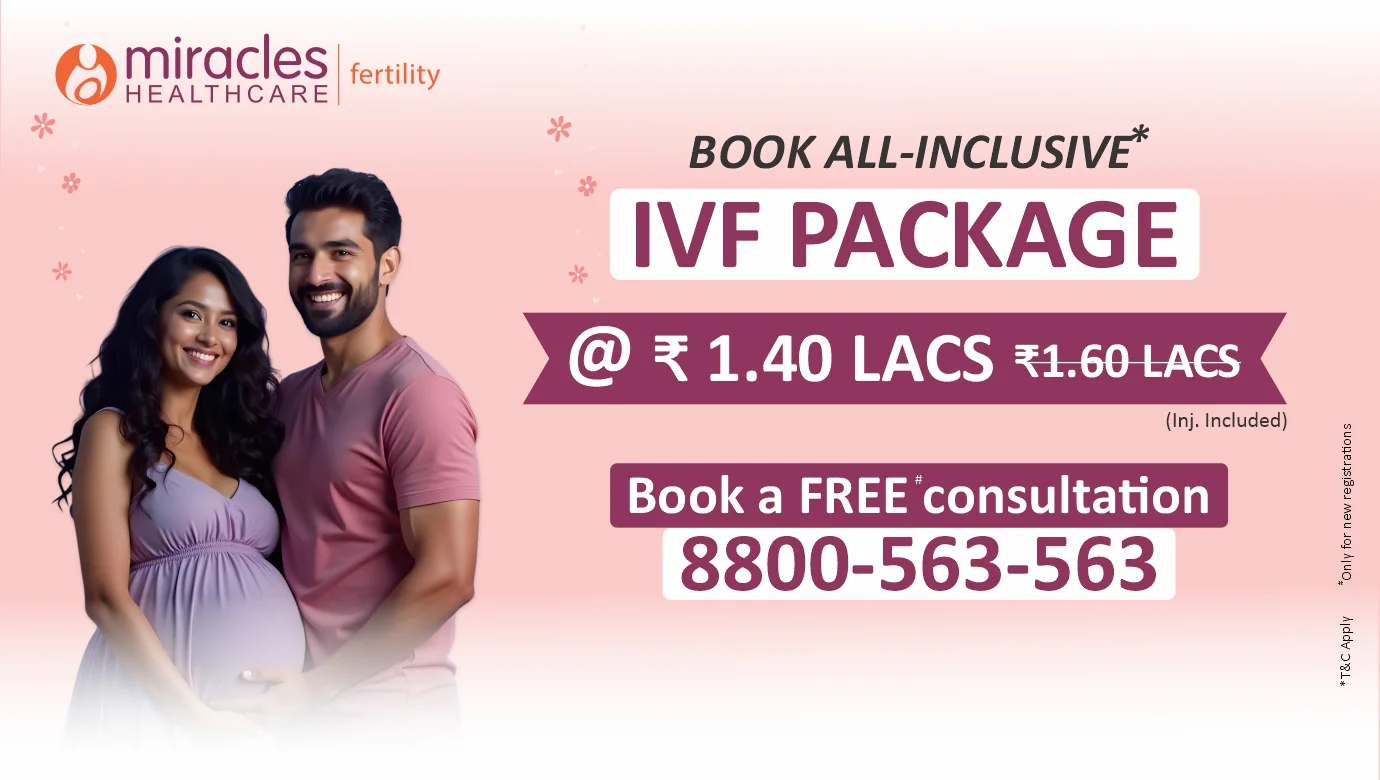Fertility Conditions We Treat
Comprehensive Care for Your Health

In-vitro fertilization (IVF) is a leading assisted reproductive technology that has helped countless couples overcome fertility challenges. This procedure involves fertilizing the egg and sperm in a laboratory setting, offering a ray of hope for individuals and couples struggling to conceive.
At Miracles Healthcare, we offer comprehensive IVF treatment in Gurgaon, providing tailored solutions based on individual needs. Whether you choose to use your eggs and your partner's sperm or opt for egg and sperm donation, our IVF specialists ensure a safe, successful, and compassionate approach to fertility treatment. We also consider important factors like the IVF age limit, as it play a key role in determining the best approach for each patient’s fertility journey.
In-vitro fertilization (IVF) is an advanced fertility treatment that helps individuals and couples conceive when other methods have not been successful. The process involves retrieving eggs from the ovaries and fertilizing them with sperm outside the body in a laboratory. Once fertilization occurs, the resulting embryos are carefully monitored, and the healthiest one is selected to be implanted in the woman's uterus, leading to pregnancy. IVF is a valuable option for individuals facing a range of fertility challenges, from blocked fallopian tubes to male infertility, or even those who are using donor eggs or sperm.
In-vitro fertilization (IVF) is a highly effective fertility treatment designed to help individuals and couples overcome various reproductive challenges and conceive a child when natural conception is not possible. The IVF procedure is recommended when one or both partners experience any of the following medical conditions:
Bilateral/Unilateral Fallopian Tube Damage or Blockage: IVF can bypass blocked or damaged fallopian tubes, making it possible to fertilize the egg outside the body.
PCOS and Other Ovulation Disorders: IVF helps individuals with polycystic ovary syndrome (PCOS) or other ovulatory issues to conceive by stimulating healthy egg production.
Endometriosis: Women with endometriosis often face difficulty conceiving due to abnormal tissue growth. IVF can offer a solution by bypassing these complications.
Uterine Fibroids: Fibroids can interfere with implantation or cause complications during pregnancy. IVF allows doctors to focus on creating a healthy embryo outside the uterus.
Impaired Sperm Production or Function: IVF can help men with sperm production or quality issues by utilizing sperm extraction techniques like ICSI (Intracytoplasmic Sperm Injection).
Poor Egg Quality: In cases where the quality of eggs is compromised, IVF may involve the use of donor eggs to increase the chances of successful fertilization.
Unexplained Infertility: IVF is often recommended when no specific cause of infertility is found, providing a solution to couples struggling with conception.
Genetic Disorders: IVF allows for genetic screening of embryos (PGD/PGS) to prevent the transmission of inherited genetic conditions.
At Miracles Healthcare, we offer state-of-the-art IVF treatment and expert care to help individuals and couples facing these and other fertility challenges. With our personalized IVF procedures and advanced techniques, we aim to increase the chances of successful conception and a healthy pregnancy.
In-vitro fertilization (IVF) is a complex and precise fertility treatment designed to assist couples who are struggling to conceive. The IVF procedure typically spans around four to six weeks, from the preparation stage to the pregnancy test.
1. Pre-Treatment Checkups: Before beginning the IVF cycle, both partners undergo a thorough evaluation by a fertility specialist. This initial assessment includes:
A review of the couple’s medical history
A physical examination
A variety of fertility tests
For the woman, this includes blood tests and ultrasound imaging to evaluate ovarian reserve. For the male partner, a semen analysis is performed to assess sperm quality. Based on the findings, the couple will receive counseling and guidance, preparing them for the IVF procedure.
2. Stimulation of Ovaries: The first step in the IVF treatment process is ovarian stimulation. Hormonal medications are given to females to stimulate the ovaries to produce multiple eggs. Regular blood tests and ultrasounds are conducted to monitor the development of follicles (which contain the eggs) and ensure they are growing appropriately.
3. Egg Retrieval: Once the follicles reach the optimal size, an egg retrieval procedure is performed. This is typically done under light sedation or anesthesia to ensure comfort. A needle is carefully guided through the vaginal wall to aspirate the eggs from the follicles.
4. Sperm Collection and Fertilization: On the same day as the egg retrieval, the male partner provides a semen sample. The highest-quality sperm are selected and combined with the retrieved eggs. In many cases, ICSI (Intracytoplasmic Sperm Injection) is used to facilitate fertilization by directly injecting sperm into each egg. The fertilized eggs are then incubated overnight.
5. Embryo Development: Once fertilization occurs, the eggs begin to develop into embryos. These embryos are monitored for three to five days in a specialized laboratory to ensure optimal growth and quality. Once the embryos reach the desired stage, the most viable ones are selected for transfer. In some cases, preimplantation genetic testing (PGT) is done to screen for genetic disorders or chromosomal abnormalities.
6. Embryo Transfer: The best-quality embryos are transferred into the woman’s uterus using a thin, flexible catheter. The procedure is generally painless, but mild sedation may be provided to ensure comfort. Any remaining healthy embryos can be frozen for future use.
7. Pregnancy Testing and Follow-up: Approximately two weeks after the embryo transfer, a pregnancy test is conducted to check if the IVF procedure was successful. If the test is positive, further monitoring is done to ensure a healthy pregnancy. Early ultrasounds may be performed to detect the fetal heartbeat and confirm the proper development of the pregnancy.
Preparing for IVF (In-vitro Fertilization) involves taking several key steps to ensure your body is ready for the procedure and to increase the likelihood of a successful outcome. While IVF can be a highly effective infertility treatment, it’s essential to adopt certain lifestyle changes and undergo specific medical preparations. Below are some important things to do in consultation with your fertility doctor to prepare for IVF:
Get a Physical Exam and Blood Tests: Before starting IVF treatment, a comprehensive physical exam and a series of blood tests will be conducted to assess your overall health, hormone levels, and fertility status. This helps the doctor understand your medical history and any underlying conditions that might affect the success of IVF.
Limit Your Caffeine Intake: Excessive caffeine consumption may negatively affect fertility and the IVF process. It is advisable to reduce or eliminate caffeinated beverages like coffee, tea, and energy drinks from your daily routine. Consult with your doctor to determine a safe level of caffeine intake during the IVF cycle.
Avoid Smoking and Drinking Alcohol: Smoking and alcohol consumption can reduce the quality of both eggs and sperm, making it harder to achieve a successful IVF outcome. Both partners should refrain from smoking and drinking alcohol to optimize fertility and improve chances of conception.
Maintain a Healthy Weight: Being either underweight or overweight can affect hormone balance and fertility. Aim to achieve a healthy weight by following a balanced diet and engaging in regular exercise. A healthy weight can improve the success rates of IVF and reduce complications during the treatment process.
Perform Light to Moderate Exercises Regularly: Regular exercise helps maintain overall health, balance hormones, and reduce stress levels. Aim for light to moderate physical activities, such as walking, swimming, or yoga, to stay in good shape. However, avoid intense or strenuous exercise, which could disrupt your fertility.
Manage Your Stress Levels: IVF treatment can be emotionally and physically challenging, so managing stress is vital for your mental well-being. Techniques such as meditation, deep breathing exercises, and mindfulness can help you cope with stress. Consider speaking to a counselor or joining a support group for emotional support.
Eat a Well-Balanced Diet: A nutritious, well-balanced diet rich in fruits, vegetables, lean proteins, and whole grains is crucial for supporting your body through IVF. Foods rich in antioxidants, such as berries and leafy greens, can improve egg and sperm quality. Your doctor may also recommend specific supplements like folic acid to support fertility.
Get Good Sleep: Adequate sleep is essential for your body’s ability to function properly and regulate hormone levels. Aim for at least 7-8 hours of quality sleep each night to support your physical and emotional health during the IVF process.
Avoid Taking Any Medication Without Consulting Your Doctor: Some medications can interfere with the IVF process or affect fertility. Avoid taking any medication whether prescription or over-the-counter without first consulting your IVF specialist. Ensure that your doctor is aware of all medications and supplements you are currently taking.
In-vitro fertilization (IVF) is typically recommended for individuals or couples who have been unable to conceive after trying for at least a year and face specific infertility challenges. IVF offers a solution when natural conception is not possible due to certain medical conditions. Here are the common situations where IVF may be required:
Blocked or Damaged Fallopian Tubes: If the fallopian tubes are blocked or damaged, it prevents the egg from reaching the uterus or obstruct sperm from traveling to the egg. IVF bypasses the fallopian tubes by directly fertilizing the egg in the lab and implanting the embryo into the uterus.
Endometriosis: Endometriosis can cause scarring and adhesions in the reproductive organs, making it difficult for the egg to be fertilized or properly implant in the uterus. IVF offers a viable solution for women with endometriosis by helping bypass these physical barriers to conception.
Polycystic Ovary Syndrome (PCOS): Women with PCOS often experience irregular ovulation cycles, leading to difficulties with conception. IVF can help stimulate ovulation and assist in egg retrieval to increase the chances of fertilization.
Male Factor Infertility: In cases of male infertility, such as low sperm count, poor sperm motility, or abnormal sperm morphology, IVF can be paired with ICSI (Intracytoplasmic Sperm Injection), in which sperm is injected directly into an egg to assist fertilization.
Irregular Ovulation Cycles: Women who experience irregular ovulation cycles (often due to hormonal imbalances) may face difficulties with natural conception. IVF helps by stimulating the ovaries to produce multiple eggs, improving the chances of successful fertilization.
Unexplained Infertility: If infertility remains unexplained after extensive testing, IVF can be a recommended option. This treatment bypasses various natural barriers to fertilization, offering a chance for conception even when the cause of infertility is not clear.
If you have been struggling to conceive for a year or more, consult the fertility specialist near you for advanced IVF treatments tailored to your needs.
In-vitro fertilization (IVF) offers several significant advantages, making it a highly effective solution for couples struggling with infertility. Some of the most notable benefits include:
1. High Success Rate: IVF is one of the most successful assisted reproductive technologies, with advancements in medical techniques continually improving the chances of conception. With proper monitoring and treatment, IVF can significantly increase the chances of a successful pregnancy.
2. Overcomes Infertility Problems in Both Males and Females: IVF addresses a wide range of infertility issues for both men and women, including low sperm count, blocked fallopian tubes, endometriosis, and other conditions that make natural conception difficult. IVF can overcome these barriers, providing hope to those facing infertility challenges.
3. Treats Various Types of Infertility Conditions: IVF is versatile and can be used to treat various infertility conditions, including:
Male infertility
Female infertility
Ovulation disorders
4. Used with Eggs or Sperm from a Donor: In cases where one partner has fertility challenges, IVF can be performed using donor eggs or sperm. This allows individuals or couples to still achieve a successful pregnancy even if they cannot use their genetic material.
5. Genetic Screening of Embryos: One of the key advantages of IVF is the ability to perform preimplantation genetic testing (PGT) on embryos. This screening process helps identify genetic abnormalities and chromosomal disorders, ensuring that only healthy embryos are transferred into the uterus, reducing the risk of genetic diseases.
6. Creation of Multiple Embryos: During an IVF cycle, multiple eggs are retrieved and fertilized, allowing doctors to create multiple embryos. This increases the chances of a successful pregnancy, as several embryos can be implanted, and any remaining viable embryos can be cryopreserved for future use.
Age plays a significant role in determining the success of in-vitro fertilization (IVF) treatment. As a woman's age increases, the quality and quantity of her eggs naturally decline, which can affect the success rate of IVF. However, IVF success rates can vary depending on various factors, including the fertility clinic, the cause of infertility, and the method of treatment.
Here is a general overview of IVF success rates based on age:
1. Under 35 Years: Women under the age of 35 tend to have the highest success rates with IVF. This is because egg quality is typically optimal in this age range, leading to higher chances of fertilization, embryo development, and successful pregnancy.
Success Rate: Approximately 40-50% per IVF cycle.
2. 35 to 37 Years: While the success rate for women in this age group remains relatively high, there is a slight decline due to decreasing egg quality and quantity. However, many women in their mid-30s still have good chances of IVF success.
Success Rate: Approximately 30-40% per IVF cycle.
3. 38 to 40 Years: As women approach 40, the success rate of IVF starts to decrease more significantly. Egg quality continues to decline, which affects embryo quality and increases the likelihood of miscarriage. However, IVF can still be successful with appropriate medical intervention, such as using donor eggs.
Success Rate: Approximately 20-30% per IVF cycle.
4. 41 to 42 Years: IVF success rates for women over 40 drop considerably due to a significant decline in both egg quality and quantity. Women in this age group may benefit from egg donation or the use of frozen embryos for higher success chances.
Success Rate: Approximately 10-20% per IVF cycle.
5. 43 Years and Above: IVF success rates in women over 43 are relatively low due to the advanced decline in egg quality. In many cases, egg donation is recommended for women in this age group to improve the chances of conception.
Success Rate: Approximately 5-10% per IVF cycle.
Egg quality and quantity: This naturally declines with age, impacting fertilization and embryo development.
Embryo quality: The better the embryo quality, the higher the chance of implantation and a successful pregnancy.
Fertility diagnosis: The underlying cause of infertility plays a role in success rates.
Use of donor eggs/sperm: Success rates can be significantly higher when using donor eggs or sperm, especially for women over 40.
Health and lifestyle factors: Maintaining a healthy lifestyle, managing stress, and avoiding harmful habits like smoking can improve the chances of IVF success.
After undergoing In-Vitro Fertilization (IVF), it’s natural to experience various physical and emotional changes. Here’s what you can expect in the days following the embryo transfer:
Light Spotting or Bleeding: Light spotting or mild bleeding can occur, often referred to as implantation bleeding, which may indicate that the embryo is attaching to the uterine lining. However, not all women experience this, and the absence of spotting doesn’t mean the treatment was unsuccessful.
Pelvic Pain and Cramping: Mild pelvic cramps similar to menstrual cramps are common after IVF treatment. These can be due to the implantation process or the hormonal medications taken during the cycle.
Fatigue and Tiredness: IVF medications, hormonal fluctuations, and the emotional stress of the process can lead to fatigue. Getting adequate rest and maintaining a healthy diet can help combat tiredness.
Breast Tenderness and Sensitivity: Due to hormonal changes, breasts may feel sore, swollen, or tender to the touch. This is a common side effect of progesterone supplementation used to support early pregnancy.
Nausea and Digestive Issues: Some women experience nausea, which could be an early pregnancy sign or a reaction to hormonal changes. Constipation and bloating are also common due to increased progesterone levels slowing down digestion.
Changes in Vaginal Discharge: Increased vaginal discharge may occur, often as a result of hormonal medications or embryo implantation. If the discharge has an unusual color or foul odor, consult your doctor.
The cost of the IVF treatment can be affected by various factors including the patient's existing health, the clinic or hospital chosen for treatment, the medications, any additional procedures involved, the type of IVF, no. of cycles, and follow-up care.
Although In-Vitro Fertilization (IVF) is a widely used and effective fertility treatment, it does come with certain risks. Understanding these risks can help you make an informed decision and take necessary precautions during the process.
Ovarian Hyperstimulation Syndrome (OHSS): Some women experience an overreaction to fertility medications, leading to swollen, painful ovaries. Symptoms include bloating, nausea, vomiting, weight gain, and abdominal pain. In severe cases, hospitalization may be required, but it is rare.
Multiple Births: IVF increases the chances of twins, triplets, or more, especially when multiple embryos are transferred. Carrying multiples can lead to complications such as premature birth, low birth weight, and gestational diabetes.
Miscarriage: While IVF pregnancies have a similar miscarriage rate as natural conceptions, the risk increases with maternal age. Genetic screening of embryos through Preimplantation Genetic Testing (PGT) can help reduce the risk.
Premature Delivery and Low Birth Weight: Babies conceived through IVF have a slightly higher risk of being born early or having a low birth weight. Close monitoring and proper prenatal care can help manage this risk.
Ectopic Pregnancy: In rare cases, the embryo may implant outside the uterus, usually in the fallopian tubes. This is known as an ectopic pregnancy and requires immediate medical attention as it can be life-threatening.
Birth Defects: The risk of birth defects is slightly higher in IVF pregnancies, but this is largely due to maternal age rather than the procedure itself. Advanced genetic testing can help detect and prevent certain congenital conditions.
Emotional and Mental Stress: The physical, emotional, and financial toll of IVF can be overwhelming for many couples. It is important to have a strong support system and seek professional counseling if needed.
Here are some tips you may consider to take care after IVF treatment:
Take Rest
Eat a Healthy and Well-Balanced Diet
Avoid Strenuous Exercises
Take Your Prescribed Medication
Keep Yourself Hydrated
Avoid Sexual Activities
Avoid Caffeine
Avoid Drinking Alcohol and Smoking
Miracles Fertility and IVF Clinic is one of the top ICMR-approved IVF centers in Gurgaon, offering world-class fertility treatments to couples struggling to conceive naturally. Our expert team of IVF specialists in Gurgaon is committed to guiding you through every step of your fertility journey with care and expertise.
Advanced Embryology Lab: Our clinic is equipped with a fully automated, state-of-the-art embryology lab for high-precision fertilization and embryo culture.
Experienced IVF Specialists: Our highly skilled fertility experts have years of experience in performing successful IVF procedures, ensuring personalized treatment for each patient.
High Success Rates: We take pride in our exceptional IVF success rates of over 65%, especially for couples with previous failed attempts or complex fertility challenges.
Cutting-Edge Technology: From blastocyst transfer and laser-assisted hatching to ICSI and preimplantation genetic testing (PGT), we use the latest reproductive technologies to enhance success rates.
Personalized Treatment Plans: We understand that every patient’s fertility journey is unique. Our customized treatment plans address individual needs, whether using our own gametes or donor eggs/sperm.
Comprehensive Care & Support: Our team offers one-on-one counseling, emotional support, and expert guidance to ensure a smooth and stress-free IVF experience.
At Miracles Fertility and IVF Clinic, we believe in turning dreams into reality. Our mission is to bring happiness to families by providing affordable, advanced, and ethical fertility treatments in a compassionate environment. Book your consultation today with the best IVF specialists in Gurgaon and take the first step toward parenthood!


Comprehensive Care for Your Health
Meet our expert team of Fertility Experts where compassionate care meets expertise.
Inspiring Journeys: True Patient Stories
Miracles Healthcare is a leading multispeciality hospital in Gurgaon. We are committed to providing comprehensive and high-quality medical care across all specialties under one roof.






Your Health, Our Network: Comprehensive Care Across Every Facility.
Learn about the world class health care we provide
Expert Advice and Health Tips
Learn about the world class health care we provide
In general, IVF therapy is not a painful procedure. Our experienced doctors will discuss various anesthetic options with you prior to the treatment to ensure your comfort throughout the process.
IVF treatment is generally considered safe with a low risk of complications. The process should be performed by experienced fertility specialists who follow established protocols and guidelines.
The cost of two IVF cycles is ₹2 Lacs (originally ₹2.70 Lacs) in this special Valentine’s Day offer.
The most challenging parts are the emotional stress, hormone injections, and uncertainty of success.
Yes, if the mother’s egg and father’s sperm are used, the baby will genetically resemble both parents, just like in natural conception.
IVF offers several benefits for individuals and couples facing infertility issues such as blocked fallopian tubes, uterine abnormalities, low sperm count, poor sperm motility, etc. During the IVF procedure, meticulous selection of the healthiest sperm and egg takes place for fertilization. Subsequently, the most viable embryo is chosen for implantation, significantly enhancing the likelihood of achieving a healthy pregnancy and baby.
The recovery time for IVF treatment varies from person to person and type of IVF procedure. Some people take a few days to full recovery, while others may take a few weeks or even months to fully recover.
IVF helps by fertilizing an egg with sperm in a lab and then transferring the embryo into the uterus to establish pregnancy.
Yes, IVF babies are completely normal and healthy, just like naturally conceived babies. They grow, develop, and live normal lives.
IVF is generally safe, though there’s a slightly higher risk of preterm birth or low birth weight. With advanced techniques, these risks are minimal.